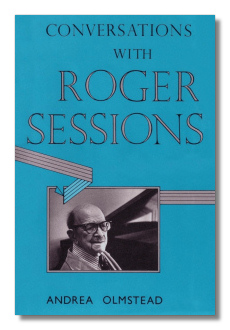
The Internet's Premier Classical Music Source
Related Links
-
Introduction
Acoustics
Ballet
Biographies
Chamber Music
Composers & Composition
Conducting
Criticism & Commentary
Discographies & CD Guides
Fiction
History
Humor
Illustrations & Photos
Instrumental
Lieder
Music Appreciation
Music Education
Music Industry
Music and the Mind
Opera
Orchestration
Reference Works
Scores
Thematic Indices
Theory & Analysis
Vocal Technique
Search Amazon
Recommended Links
Site News
 Book Review
Book Review
Conversations with Roger Sessions

Andrea Olmstead, editor
Boston: Northeastern University Press. 1987. 274 pp
ISBN 1555530109
A wonderful book. Sessions talks about music and a lot of other things, as befits his capacious mind. Topics include tonality, atonality, musical life in the United States, thoughts on various composers, how at least one composer goes about his business, politics, as well as Sessions's own life and works. Andrea Olmstead, in the running for Sessions's Boswell, keeps the man on topic – Sessions loves tangents – but also strikes a nice balance and often lets him run. Most of the time, we read composers to get insights into music we already know. I doubt, for instance, I'd want to read a book by, say, Meyerbeer, since I don't know a lot of Meyerbeer and the little I do know I dislike. The book must give me some other reason to read it. Consequently, I doubt whether most readers would be tempted to look at what Sessions has to say and would find the sections on his own works the least interesting, simply because most don't know a lot, or any, of Sessions's music.
Sessions came from the Copland-Thomson-Harris generation of American music. He studied with Ernest Bloch and came away with a formidable technique and a fire to find his own path. Unlike most other outstanding composers of his generation, he did not study with Boulanger, and after his early period, moved away from the Stravinskian sphere of influence. He became increasingly interested in Schoenberg, although, like his great friend Dallapiccola, he never followed dodecaphonic serialism all that strictly. He learned much from his own writing, particularly his grand opera Montezuma, a huge piece inspired in part by Prescott's Conquest of Mexico and one which influenced Session's later work greatly. I've heard (and performed as a chorister) only the last act, but I want to hear more.
Sessions, through no fault of his own, became another musical bogeyman. I suppose when most people think of him, if they do at all, they imagine forbidding, austere, "cerebral" (in a pejorative sense) music. Certainly, with the exception of his incidental music for The Black Maskers (wonderful, by the way; sort of an American equivalent of the early Stravinsky ballets) and his first symphony, that's how I thought of him. It took several things to change my mind. First, Andrew Porter, as music critic for The New Yorker, championed him. I thought Porter so perceptive a critic, I ran out and bought every Sessions LP he recommended. I also, as I said, took part in a concert performance of the last act of Montezuma. Continued exposure to the music in rehearsal made me realize that, far from some cold-blooded musical Moriarity at the center of an unholy web, this was a passionate, highly Romantic composer, who took long breaths and big strides. Sessions didn't go in for what we've come to accept as musical Americana, but to me he and Ives are the two American composers with a spirit and sense of vista as encompassing as Whitman's.
At any rate, there's more here than Sessions on himself. His reading was broad and encompassed several literatures in their original languages. He spent many years in Italy, France, and Germany and could read and write all these tongues. He also knew some Russian, enough to converse with Shostakovich. Indeed, Shostakovich became a Sessions admirer. I find most trenchant Sessions on the current musical scene and on musical aesthetics. Contrary to what one might expect, it's hardly theoretical at all. What comes through is Sessions's strong practical and empirical bias. Indeed, he tends to castigate theoreticians and tries, whenever he can, to avoid the jargon of musical aesthetic discussion. One example will suffice:
There is no twelve-tone idiom; every composer has his own idiom. But of course, all these words are so confused, they're so loosely used. The word "style" is hopelessly confused. This business of style analysis: If it is style, it can't be analyzed. What they call "style analysis" is vocabulary. Vocabulary is a very broad term, too.
Sessions characteristically makes sense. His ideas about music spring from the fact that he plays it and writes it. They ring true and reasonable, rather than partisan or hobby-horsey. The prose is clear and, excepting discussions of specific pieces of music, not excessively technical. Indeed, most of the time, Sessions reacts against that kind of discussion as extremely boring and not necessarily helpful. While technical knowledge and the ability to read music might enhance a very few sections of the book, it probably won't dim the lay reader's appreciation of the rest. Sessions wants to demystify things, and in very large part he succeeds.
Copyright © 2000 by Steve Schwartz.


















